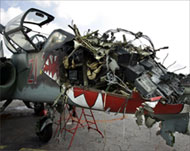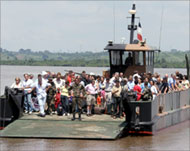France urges sanctions on Ivory Coast
France has sought a vote in the UN Security Council to impose an arms embargo and other bans on Ivory Coast after a ceasefire was broken.

The vote, which may take place late in the afternoon, was delayed last week to give African Union (AU) officials a chance to negotiate a truce between rebel soldiers, who control the north of the country, and the government, which holds the south.
France‘s draft resolution, co-sponsored by the US, Britain, Germany, Spain, Romania and Chile, would impose an arms embargo on all sides.
It also calls for a travel ban and a freeze on funds and other financial assets to be imposed against unspecified individuals to be decided later by a Security Council panel.
Ivory Coast President Laurent Gbagbo is likely to be on the list, diplomats said, as well as individuals who threatened the peace and reconciliation process, as well as those “determined as responsible for serious violations of human rights”, the resolution says.
Immediate action
A summit among West African leaders in Nigeria on Sunday backed the arms embargo and asked that it be imposed immediately – rather than on 10 December as a draft resolution proposed – to stop the collection of more weapons.
 |
|
French troops destroyed Ivory |
President Olusegun Obasanjo of Nigeria, the current chairman of the AU, warned there was evidence that both government and rebels were seeking to buy weapons. “We support the proposed UN resolution, in particular the arms embargo. This should be immediate,” he said.
Even before the leaders – from Nigeria, Ghana, Senegal, Gabon, Togo and Burkina Faso – had arrived in Abuja, Gbagbo had set the scene by unexpectedly naming Colonel Philippe Mangou as the new armed forces chief.
Observers at the talks warned that the naming of Mangou – who is thought to have directed the air raids that killed nine French peacekeepers on 6 November – was a sign that the government was bent on confrontation.
Gbagbo also vowed to rebuild his small air force, destroyed by France in apparent retaliation for the killing of their peacekeepers.
Military sources said the government had already ordered some fighter planes and military helicopters.
The president’s supporters reacted to the air force’s destruction with fury, provoking anti-French riots in the commercial capital Abidjan.
French troops have since evacuated more than 5000 foreigners.
Alarmed
AU leaders also expressed concern over reports that during their meeting electricity and water supplies had been cut off to the north, just as they had been before an attempted government offensive earlier this month.
 |
|
Gbagbo is accused of cutting |
“We are alarmed because this has been used in the past as a prelude to an armed attack and we call on everybody to observe a ceasefire and not to start anything that could amount to mounting a further attack,” Obasanjo warned.
Gbagbo’s envoy to the summit, Ivorian speaker of parliament Mamadou Koulibaly, was clearly angered by the statement.
He said after the meeting that he had complained to the African leaders that French forces had “crushed unarmed civilians with their tanks” during protests in Abidjan and called their presence “an illegal occupation”.
He said the arms embargo would not worry his government, as it had no intention of restarting hostilities. “For us the war is over,” he said.
Gbagbo’s response
In an interview published on Monday in Ivory Coast’s Liberation Daily, Gbagbo dismissed as an insult comments by French President Jacques Chirac that France will continue its UN-mandated action in the West African nation and will not stand by while a situation of anarchy or fascism develops.
 |
|
French troops have evacuated |
“President Chirac supported the only party in Ivory Coast for 40 years. What is closer to fascism than a one-party system?” Gbagbo said.
“We were in prison under the regime of the sole party supported by France. It’s an insult.”
He also accused colonial power France of “navel-gazing” and “forever bringing the Ivory Coast story back to themselves” while “my country is on the road to a transition towards democracy”.
“France is still very involved in our internal political life, notably with the presence of its army,” he added.
Gbagbo added: “The French soldiers are already less present in the streets. Their massive deployment was intolerable; it resembled the [Soviet] invasion of Prague in 1968.”
Tense
Aljazeera’s correspondent in Abidjan, Abululla Walad Muhammadi, reported the situation in the capital remained tense.
He said there was a strong presence of French troops in joint patrols with government and UN troops, in some parts of the capital, but young supporters of Gbagbo controlled some roads.
Ivory Coast has been divided into two warring camps since September 2002, when northern soldiers mounted a rebellion against Gbagbo’s rule.
The conflict subsided into a tense stand-off early last year after France and West African officials negotiated a ceasefire deal and launched a political peace process that brought former rebel fighters into a unity government.
But the interim government has struggled to make its authority felt, with Gbagbo and his allies retaining real control only in the south. Hostilities broke out again on 4 November when government jets bombed northern cities.